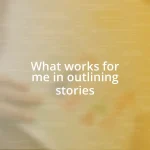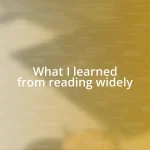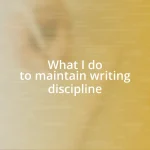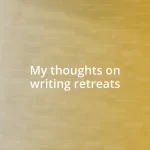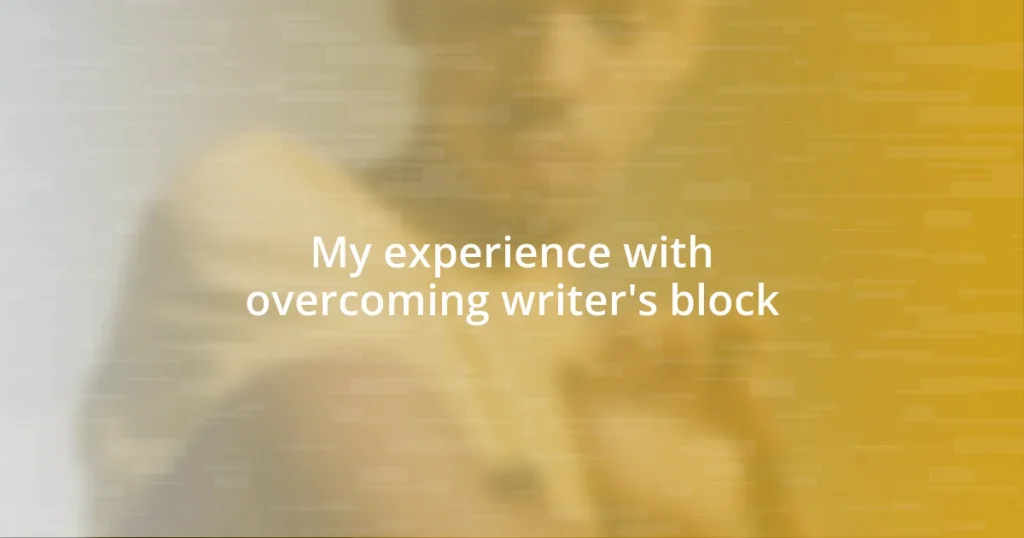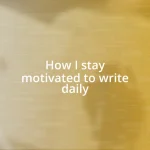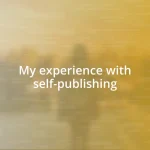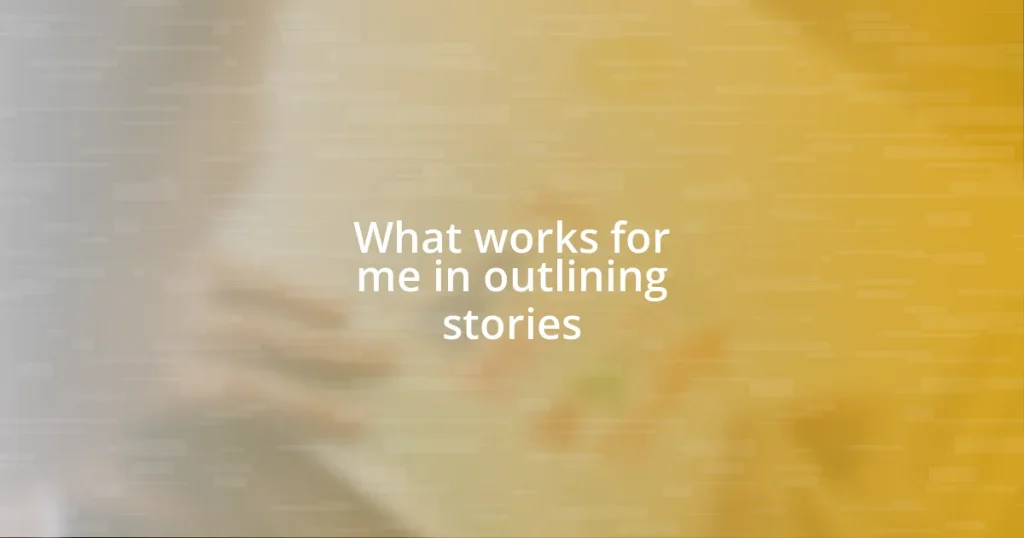Key takeaways:
- Writer’s block can stem from emotional states, stress, perfectionism, and fear of failure, highlighting the importance of acknowledging feelings to enhance creativity.
- Embracing spontaneity through creative prompts and engaging in unrelated activities can significantly boost inspiration and alleviate writer’s block.
- Establishing a consistent yet flexible writing routine and nurturing a supportive writing community are essential for maintaining long-term writing flow and personal growth.

Understanding writer’s block
Writer’s block can feel like an insurmountable wall, where every word I try to conjure seems just out of reach. I vividly remember staring at a blank screen for hours, the cursor blinking at me mockingly. Has this happened to you too? It’s a frustrating experience that many writers face, often stemming from fear of failure or self-doubt.
Understanding the roots of writer’s block is crucial. I’ve often found that stress plays a significant role in stifling my creativity. For example, during a particularly busy period at work, I struggled to write even a single sentence. I had to recognize that my mental bandwidth was already overloaded, and that realization helped me approach my writing from a kinder perspective.
There’s a misconception that writer’s block is purely about lack of ideas, but it can also be tied to emotional states. When I feel anxious or overwhelmed, my writing often stops dead in its tracks. This prompts me to question: What if acknowledging those emotions, rather than suppressing them, could be the key to unlocking creativity? Reflecting on my feelings has often led me to unexpected breakthroughs in my writing process.

Causes of writer’s block
Facing writer’s block can often feel like wading through molasses. For me, one of the biggest culprits is perfectionism; I sometimes find myself gripped by the idea that everything I write must be flawless from the start. This pressure can paralyze my creativity. I remember a time when I edited even the simplest sentences to death, and as a result, I produced nothing at all. It’s a harsh reminder that striving for that unattainable ideal can lead to stagnation.
- Fear of failure: Worrying about how others will perceive my work can be a significant impediment.
- Perfectionism: The desire to get everything right can stifle the flow of ideas.
- Lack of inspiration: Sometimes, I simply go through phases where my mind feels devoid of creative sparks.
- Stress and anxiety: When life’s pressures mount, it can be hard to focus on writing.
- Emotional turmoil: Personal issues can deeply affect my writing state, making it challenging to express even simple thoughts.
- Routine disruptions: Changes in my daily schedule can throw me off balance and impact my creative tendencies.
In my experience, understanding these causes helps to not only navigate writer’s block but also to tackle it preemptively. When I identify the root of my block, I feel more empowered to work through it.
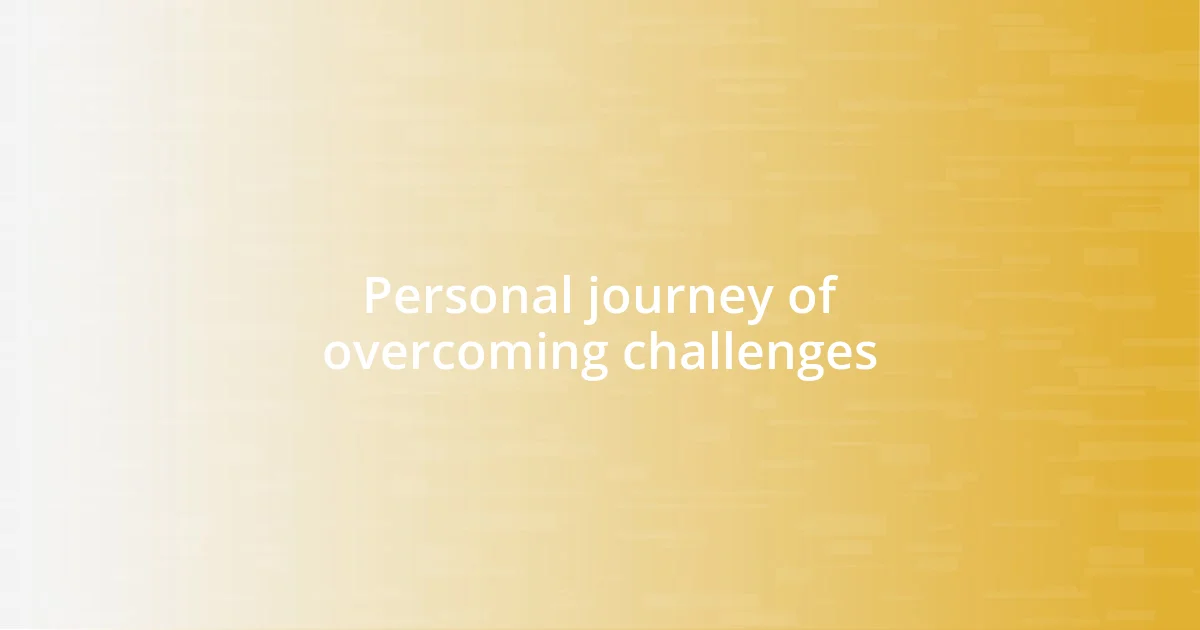
Personal journey of overcoming challenges
As I ventured through my writing journey, I encountered several challenges that taught me resilience. There were days when I felt completely drained, almost as if the white page could absorb my energy. I vividly recall a period when I decided to take short walks outside instead of forcing myself to write. Those moments of fresh air and changing sights would often spark ideas, allowing me to return rejuvenated and ready to create.
There’s a beauty in embracing the struggle rather than resisting it. One time, I found myself knee-deep in a project that had me wrestling with my self-doubt. Rather than shutting down, I started journaling my thoughts and feelings. This practice became a release valve for my anxiety, transforming frustration into raw material for my writing. It was a lesson in turning a challenge into an opportunity, showing me that vulnerability can fuel creativity.
Ultimately, I learned that my personal journey with overcoming these challenges was about trial and error. I experimented with different techniques, like free writing and setting achievable goals, to keep my creativity flowing. Charting my progress became a rewarding experience, reminding me that each obstacle I faced could lead to growth. It made me realize that challenges don’t just block the path; they can also illuminate new routes if I’m open to exploring them.
| Challenge Faced | My Response |
|---|---|
| Creative fatigue | Took nature walks for fresh inspiration |
| Self-doubt | Journaling to process emotions and spark ideas |
| Seeking methods | Experimented with free writing and goals |

Strategies to overcome writer’s block
One strategy that I often find effective is shifting my environment. Sometimes, simply moving to a new location, like a café or a park, can work wonders. I remember a day when I was stuck at home, surrounded by distractions. After relocating to a sunny corner with a warm cup of coffee in hand, ideas began to flow effortlessly. It’s fascinating how a change of scenery can open up new perspectives.
Another approach I use is the technique of timed writing sessions. Setting a timer for just 10 or 15 minutes, I commit to writing without worrying about edits or perfection. This creates a space where I can let my thoughts spill out freely. I genuinely wish I had discovered this earlier! I often found myself overthinking every word before, but forcing myself to just write for a short burst helped me break the cycle of self-criticism and anxiety.
Additionally, incorporating relaxation practices into my routine has proven invaluable. When stress builds up, I take a few minutes to breathe deeply or do a quick meditation. It’s surprising how just slowing down can recharge my mind. Have you ever experienced that refreshing clarity after a moment of calm? For me, it feels like a reset button that aligns my thoughts and emotions, making it easier to write once I return to my work.
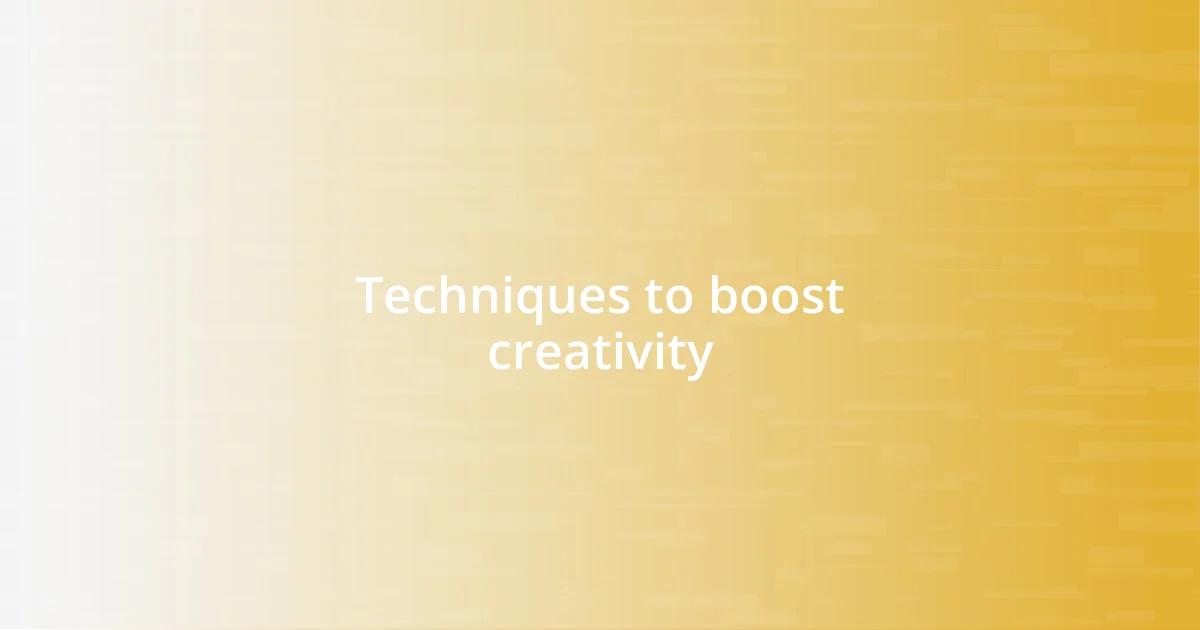
Techniques to boost creativity
One technique I swear by is embracing spontaneity through creative prompts. I often find myself staring at a blank page, but when I give myself a simple prompt like “describe a memorable smell,” the floodgates of creativity crack open. I remember a day when this technique transformed my writing session; I spent ten minutes on the smell of freshly baked bread, and it led me into a heartfelt narrative about my grandmother’s kitchen. It’s funny how a small nudge can unlock deeper stories waiting to be told.
Another method that ignites my creativity is engaging in unrelated activities. Sometimes, when I’m feeling particularly stuck, I dive into cooking or painting—something completely different from writing. I still vividly recall an afternoon spent mixing colors for a painting; it drew me out of my writer’s block. As I lost myself in the process, I realized that the act of creating in one medium can fuel inspiration in another. Have you tried stepping away from writing to explore another passion? It can be a refreshing antidote to mental stagnation.
I also find great value in collaborating with others. When I brainstorm with fellow writers, their enthusiasm and unique perspectives often light a spark in me. I recall a lively discussion with a friend about our favorite childhood books that unexpectedly led to a new story idea I hadn’t previously considered. It’s incredible how bouncing ideas off someone else can amplify creativity. Have you ever felt that energy when sharing thoughts with someone who gets your vibe? It’s like adding gasoline to a slowly burning fire.
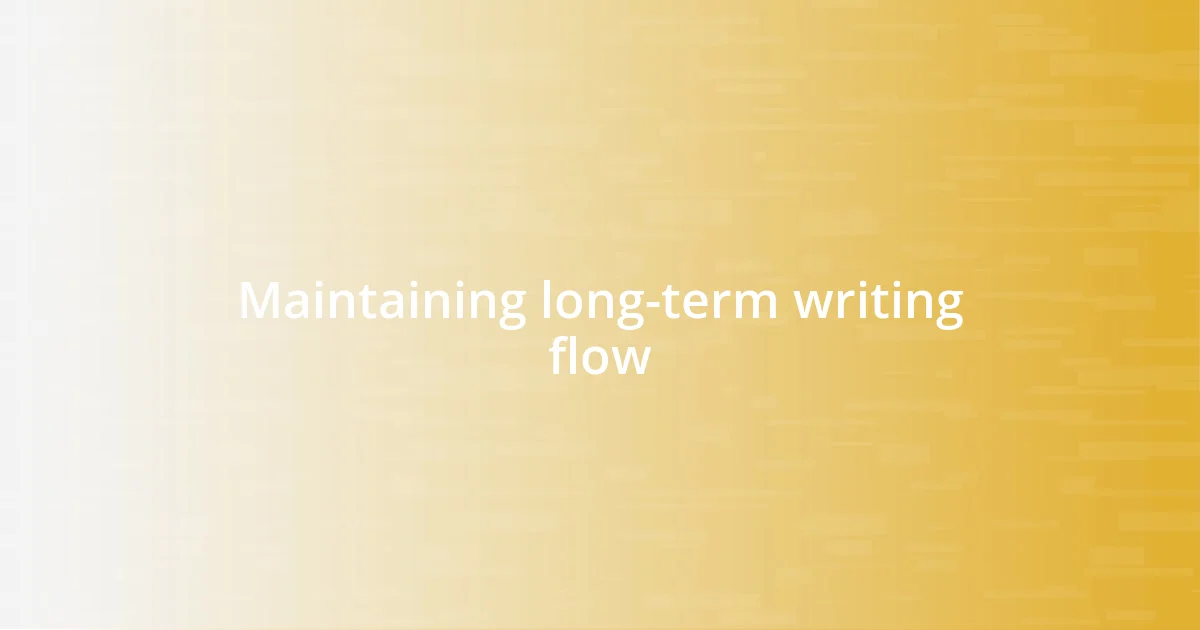
Maintaining long-term writing flow
Maintaining a long-term writing flow can be a challenge, but I’ve discovered that establishing a consistent writing routine is key. I remember when I first set aside dedicated time to write each morning, even if it was just 30 minutes. At first, it felt like a chore, but soon I found myself looking forward to that time. Have you ever felt that excitement build up just before you start? It’s amazing how creating a habit can transform the act of writing into something that feels both rewarding and natural.
Another aspect I’ve learned is to embrace flexibility within my routine. Life is unpredictable, and sometimes unexpected events disrupt my writing schedule. I recall a week where family commitments kept me away from my desk. Instead of panicking, I adapted by jotting ideas down in a notebook during quiet moments. Being open to change helped me maintain my flow even when I couldn’t write in my usual way, reminding me that creativity can flourish in various forms.
I also can’t stress enough the importance of nurturing a supportive writing community. Finding fellow writers who understand the ups and downs makes a world of difference. I once joined a local writing group where we shared our struggles and triumphs. Those encouraging sessions not only kept me accountable but also inspired me to push through tough patches. Have you ever shared your thoughts with someone who just “gets” your creative process? It’s like having a partner in a dance—supportive and invigorating.
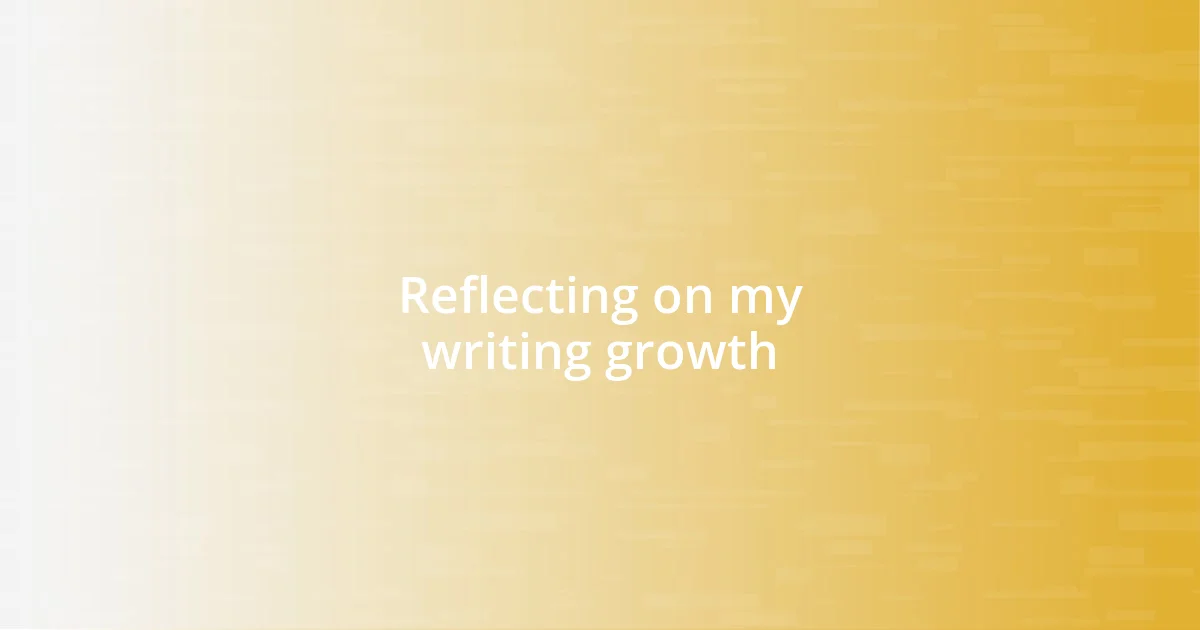
Reflecting on my writing growth
Reflecting on my writing growth, I can’t help but smile at how far I’ve come. There was a time when every blank page felt like an insurmountable mountain, and I questioned if I would ever find my voice. Yet, stepping back now, I see that each struggle pushed me towards discovering not just my style, but also my passion for storytelling. Have you ever looked back at your past work and felt a surge of pride in your progress? It’s a humbling experience.
In moments of doubt, I learned to trust my instincts more, especially when crafting stories. I vividly recall an episode during an intense brainstorming session where I allowed my thoughts to run wild on the page. I wrote without censoring myself, and suddenly, there was this unexpected twist in my narrative that took me by surprise. That moment taught me the beauty of vulnerability in writing—it’s where the magic often happens. Do you remember a time when letting go of control led to an inspiring revelation?
I’ve come to appreciate the development of my writing voice as a journey filled with experimentation. Looking back, I recall the numerous genres I dabbled in, from poetry to short fiction. Each genre shaped me differently, but it was the process of exploration that truly fueled my growth. I recently reread a piece I wrote years ago and marveled at the raw emotion captured within it. This reflection brings up a question: how often do we revisit our old work to measure our growth? I encourage you to take that leap; you might just uncover layers of your creativity that resonate with your current self.

